#also @ duo wheres the mongolian course!!!
Text
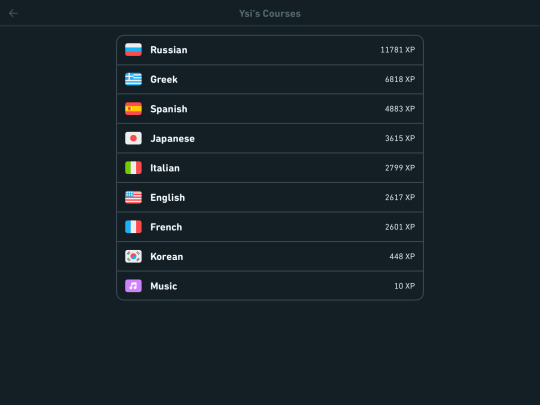
Crazy how the xp system works in duolingo bcs i skipped the french course to the very end since i already have the b2 but its at the bottom of this list, meanwhile i started learning japanese like two weeks ago and its in the top three
#m#languages#most of that xp in japanese comes from learning hiragana bcs you have to do each exercise like a million times to get the achievement#also spanish and english are there bcs im learning them from russian and greek respectively (its better that way)#fuck korean tho i doubt ill ever try to learn it again#also @ duo wheres the mongolian course!!!
1 note
·
View note
Text
Joyful Reunion, Chapter 111
Translator: foxghost @foxghost tumblr/ko-fi1
Beta: meet-me-in-oblivion @meet-me-in-oblivion tumblr
Original by 非天夜翔 Fei Tian Ye Xiang
Masterpost | Characters, Maps & Other Reference Index
Book 3, Chapter 24 (Part 6)
Duan Ling has just arrived in Mu Qing’s room, but they barely manage to say anything to each other before he’s called back again. This time, Chang Pin tactfully leaves the room, shutting the door behind him, and tells Wu Du not to go in, leaving Mu Kuangda and Duan Ling to themselves.
Mu Kuangda is no longer angry; he considers Duan Ling and says, “I had a banquet set up last night, and Huang Jian waited for you two the whole night and you never showed up. You’ll need to make him an apology.”
“Certainly,” Duan Ling says humbly.
Two cunning foxes, keeping the quiet parts unsaid; of course Mu Kuangda’s not about to spew garbage like telling Duan Ling not to let anyone know what happened the night before, and of course Duan Ling isn’t about to go around telling everyone either.
“Do you remember what the contents of the letters were? It does seem rather strange for Mongolians to send letters to each other in Han.”
One lie only begets more lies to make the first lie work — Duan Ling has somehow forgotten all about that, and he can but say, “It really was in Han. I also wondered why and found it rather odd.”
Mu Kuangda falls silent for a moment. “Write it out and let’s see.”
Duan Ling picks up the brush, and imitating Batu’s tone, he fabricates the first letter. “I don’t quite remember all the details clearly.”
Mu Kuangda calls for Chang Pin. “Go to the library and bring the last letter Borjigin Batu sent.”
Duan Ling’s heart beats wildly in his chest, and he writes out a second page. He stacks the two sheets of paper together. “The second letter was also written by Batu, but that was regarding the alliance. I don’t really remember what it said.”
By the time he finishes, Chang Pin has already brought them another letter. He sets it down in front of Mu Kuangda. Mu Kuangda compares them with a glance. “It does indeed sound like the Mongolian prince.”
It’s yet another checkpoint that Duan Ling has passed, and he lets out an inward breath of relief. Chang Pin gives it a casual look and smiles. “This handwriting of yours bears some resemblance to his, actually.”
In their younger days Duan Ling was the one who taught Batu most of his Han writing, studying and essay-composition. Duan Ling is only realising this point now. “Really?”
He takes the letter and looks over it carefully. Seeing Batu’s familiar handwriting still plagued with many grammatical mistakes, Duan Ling finds it both funny and familiar, and he cannot help but miss him. A mix of feelings rises into his heart.
“Borjigin Batu grew up in Shangjing,” Chang Pin says. “That much is true. He must have learned how to write in Han, and as Jochi never learned to read, Batu’s forgotten the ancestor’s Mongolian — he may only be able to speak Mongolian, but not write it, and that’s why he sends all his messages in Han.”
“On the contrary, I have a feeling that,” Mu Kuangda stares at the letter that Duan Ling has just written, “it’s highly probable that Batu doesn’t want others among his own people to know, and in order to stop this news from spreading and the situation from getting out of control, he wrote his letters to Amga and Khatanbaatar in Han.”
Duan Ling is rather grateful to Mu Kuangda; after all, he’s somehow justified Duan Ling’s lie for him.
“Never mind,” Mu Kuangda says, “we’ll just keep this for now and verify it later.” He then hands all three letters to Chang Pin for him to put away, and says to Duan Ling, “Wang Shan, I’m giving you a holiday so you can go home and visit your parents. You must come back in fifteen days to assist Master Chang Pin, and that’ll give you a chance to learn how to manage the estate as well.”
Duan Ling realises that this means he’s finally through the ordeal, and he gives Mu Kuangda a bow before withdrawing from the room.
“I have discovered that no matter what happens,” Chang Pin says, “Wang Shan always looks like that. He’s rather poised.”
“He can take on great responsibilities, and in the future we should take the time to nurture him. Something like this friendship between him and Qing’er is hard to come by, after all. Chang Pin, it seems we’ll have to make changes to our plans again.”
Chang Pin falls silent for a moment, and then he replies with a nod.
It’s a bright and sunny day. In the palace, Li Yanqiu is sitting in one of the palace halls, and the only person near him is Zheng Yan.
“You have got to be kidding me.” Li Yanqiu’s eyes narrow once he finishes listening to him.
Zheng Yan doesn’t speak, and merely stares at Li Yanqiu.
“Who else heard what he said?”
“Chang Liujun, Wuluohou Mu, Wu Du, Feng Duo, as well as Wang Shan from the chancellor’s estate.”
“There’s absolutely no way. How are we supposed to explain the Sword of the Realm? Would the late emperor teach his style to someone not of the family?”
“But what if even the late emperor was fooled? After all, Amga never explained the actual situation. If Wuluohou Mu was the one who swindled the late emperor to begin with …”
"If even he was fooled, then that’s fine by me. He’s already decided that’s his son, so who are we to say differently?”
Zheng Yan is struck dumb all of a sudden. He absolutely couldn’t have expected Li Yanqiu to say a thing like that.
“The crown prince seeks an audience,” the eunuch outside sing-songs.
Cai Yan is here, looking in rather good spirits. He glances at Zheng Yan, and gives him a nod. Li Yanqiu gazes at Cai Yan; Cai Yan greets him for the day first before sitting down on his knees at Li Yanqiu’s side without saying anything, just keep smiling at him.
“What is it?” Li Yanqiu asks him, “Did you miss me?”
“The Mongolians say I’m an imposter,” Cai Yan says.
Zheng Yan’s expression darkens a smidgen, but Li Yanqiu says to Cai Yan, “You don’t have to worry about what they say.”
Cai Yan adds, “That’s what they said back then too.”
Li Yanqiu carefully scans Cai Yan’s face, and suddenly breaks into a smile. Cai Yan, on the other hand, has stopped speaking, his eyes reddening, turning his gaze away.
Li Yanqiu reaches out for the back of Cai Yan’s neck to embrace him, and so Cai Yan leans on Li Yanqiu’s shoulder and begins to sob.
“You’re still thinking about all those things I said back then, aren’t you? You hold a grudge as much as your dad did. I still remember that on the day you came back you hugged me and cried just like this as well.”
Cai Yan keeps sobbing, trembling all over. Li Yanqiu says, “Once the third day of the third month passes, two years will have passed since then. I don’t even cry anymore, so how come you’re still like a child who can’t seem to grow up.”
Zheng Yan is still observing Cai Yan though, his brows drawn tight together, unsure momentarily if Cai Yan is acting.
Cai Yan rubs his face against Li Yanqiu’s shoulder, and so Li Yanqiu glances at Zheng Yan to tell him to leave the room, while holding onto Cai Yan and giving him endless words of comfort.
In a fluttering sea of peach blossoms, Duan Ling returns home, but Wu Du is nowhere to be found. As soon as he gets home he goes looking for those two sheets of paper, but when he opens the case it’s to find that they’re gone!
Duan Ling is shocked before he sees the slip of paper Wu Du has left for him in the sword case: I await you beneath the bridge.
Duan Ling’s soul has nearly been scared half out of his body, but once he figures out that Wu Du is just teasing him, he looks around, feeling rather paranoid. He packs up his things, leaves the house, and spies Wu Du’s figure flash past the alleyway. Come to think of it, even if Wu Du is playing with him, he wouldn’t dare stray too far.
Three mountains surround the shores of the Yangtze and nine rivers coil through the city of spring; waterways crisscross Jiangzhou, and nine bridges set atop limestone paths while small boats travel to and fro. Many fishermen pole their boats along the waterways, filled to the brim with river food to sell along the shore.
Peach blossoms fill the air. The main street isn’t far from the bridge, and once he’s under the bridge, Duan Ling looks around in every direction. His head bumps into a peach branch, and he immediately looks up.
Wu Du is leaning over the railing and smiling at Duan Ling below; Duan Ling runs up the bridge, but with a quick dodge, by then Wu Du has already run away.
“Wu Du! You stand right there!”
Wu Du stands at the end of the bridge looking perfectly proper. Duan Ling runs to him, and in the sunlight, Wu Du’s smile is more handsome than anything; his black martial artist robes make him look ever more soldierly in the warmth of spring. Duan Ling can’t help but take another step forward and wrap his arms around him.
“What is it?” Wu Du asks.
“What’s with you?” Duan Ling asks him in return, “Where’s the stuff?”
Wu Du gives his scabbard a pat. “My sword, my life; its death, my death.”
Duan Ling drops his head in his hand. “Why do you all like to keep important stuff in your scabbards?”
But come to think of it, aside from that hapless Amga, a scabbard for one’s sword or sabre is the best hiding place when it comes to things carried on one’s person. After all, to an assassin, their sword is always near at hand.
“Where’re we goin’?” Duan Ling asks, “Is something the matter?”
Wu Du seems a bit nervous. “Come on, down here.”
Duan Ling’s mood takes a turn for the brighter — it’s just been one thing after another lately, and now he feels like the haze has been swept aside, and the sky is wide and blue above him.
Wu Du walks to the pier by the creek’s edge, indicating that Duan Ling should board it first. Duan Ling knows Wu Du can steer a boat, and he’s rather good at it too, so he gladly gets on.
Wu Du unties the rope and leaps onto the boat. With one push of his long pole by the shore, the small boat vanishes into the boats congregating in the water market. Soon enough, it shoots out the other side like an arrow and keeps going, following the zigzagging waterways to wait in line for the Black Armours’ checkpoint at the narrow waterway entrance as they prepare to leave the city.
It’s the first time Duan Ling has ever gone on a trip by boat, and he can’t help being filled with excitement. Wu Du passes the checkpoint, pushing on the pole again; the boat leaves the waterway for the Yangtze main and the way opens up in front of them, where nothing but water meets the eye, a torrent rushing towards the east.
A thousand sails compete on the Yangtze; Wu Du hoists the sail with several quick pulls, wraps the rope around the mast several times, then tosses the rope over it casually and sits down next to Duan Ling at the prow, side by side.
“It’s so beautiful,” Duan Ling says. “Where are we going?”
“To the ends of the earth,” Wu Du says, “you want to go?”
Duan Ling suddenly feels so utterly exhausted, yet so happy, especially in the very instant he catches the bright blue sky above meeting the wide expanse of the water below; it makes him think that everything that is beautiful about the land is all right here.
“I want to go,” Duan Ling replies.
Neither of them say anything, sitting with their backs against the prow.
“When we get home again you’ll have to become the emperor. Perhaps it’ll be a long, long time before we can make it out again.”
Duan Ling understands what Wu Du means — now that they have the evidence, he has taken one step closer in his plans to return to court. Before the results of the exams are released, staying in Jiangzhou is not the best idea.
The small boat flies across the surface of the river and enters another narrow waterway before turning north. Both sides of the shore are towering mountains, more beautiful than anything he can imagine. Wu Du strips himself of his outer robe, rolls up his pants, and poles the boat along. When they happen to meet a fish merchant hawking their catch on a boat, they buy some food from them.
Meanwhile, Duan Ling has found a coal stove, and he starts a fire at the prow for cooking fish soup and rice.
He doesn’t ask where they’re going. Bit by bit he’s starting to think that if he can spend his whole life like this, that’s fine too; to live like duckweed drifting on the surface of a pond, roaming far, roaming wide. The marvellous world beyond and all the people in the world will simply turn into birds crisscrossing the skies, scattering beneath the mountain peaks. Everything would become so simple.
In the night, when rain falls, Duan Ling and Wu Du sleep in the cabin together, listening to the pitter-patter of rain landing on the river. Looking outside, all he sees is a million raindrops splashing onto the water.
When the wind picks up and blows away all the rain clouds, they lie down on the deck where they’re surrounded by a thousand miles of still water, the surface as reflective as a mirror, while a brilliant starry river shines before their eyes.
And thus two days go by. On the third day, as Duan Ling wakes up yawning, Wu Du is already pushing the boat to shore. They’ve reached a remote corner between the mountains with a limestone path that leads towards the end of the mountain range.
“What is this place?” Duan Ling asks.
Wu Du looks up into the distance. After a brief silence he says, “I’ll carry you.”
“Let’s walk together. Are we going to pray at a Buddhist temple?”
“You’ll see when you get there.” As he says this to Duan Ling, Wu Du seems a bit nervous.
They climb up the stone steps, covered in lichen from long years of disrepair. When they get to the cliff, there’s a plank walkway that snakes along the cliff face, round and round, leading deeper into the wilderness. When Duan Ling sees the first monastery gate, he finally realises why Wu Du has brought him here.
Before them is a giant, stone-carved white tiger, as life-like as the real thing, facing the great river and the world of the central plains below, surrounded by layer upon layer of clouds.
I do not monetise my hobby translations, but if you’d like to support my work generally or support my light novel habit, you can either buy me a coffee or commission me. This is also to note that if you see this message anywhere else than on tumblr, do come to my tumblr. It’s ad-free. ↩︎
43 notes
·
View notes
Text
The Best Anime to Watch If You Love Music

Quarantine has brought with it an unprecedented amount of free time. And with all those extra hours in the day, people have turned to making exorbitant amounts of bread and turning up their thermostats to get the most out of their online hot yoga classes. What have I been doing instead of learning a hobby or terraforming my Animal Crossing island you ask? Well, binge-watching anime of course.
For those of you unfamiliar with the Japanese animation genre, it is cool now I guess? Everyone from Kanye West, Kim Kardashian, Michael B. Jordan, and more have expressed their love for anime at one point or another. Luxury fashion brand Coach even has a collection inspired by the world of Naruto and the aforementioned Jordan.
With Hollywood making live adaptations of cult anime to Hulu and Netflix realizing the potential of investing in original anime and simulcasts, it has never been a better time to be an anime fan. Especially an anime fan who also loves music. So, whether you’re a seasoned binge-watching fansub veteran or a newcomer to the genre, these are the best to anime to watch if you love music.
FLCL
youtube
In all honest disclosure, FLCL may have been the very first anime I ever watched. And yet, the soundtrack is still one I find myself coming back to all these years later. Containing one of the best soundtracks of any anime to date–thanks to the pillows–the surreal six-episode sci-fi coming-of-age story is a shining example of anime's inherent ability to tell out-of-this-world stories, while still finding the space to explore the humdrum realities associated with growing up.
Regularly aired as a marathon on Adult Swim’s Toonami in the early 2000s, FLCL revolves around 12-year-old Naota Nandaba, who is suddenly hit in the head by a vintage blue Rickenbacker 4001 bass guitar. Thus, kicks off our story of robots, aliens, shady corporations plotting to destroy the world from a small countryside town, and growing up. The entire ludicrous affair is scored by Japanese indie rock band the pillows, who deliver a performance you will not be forgetting any time soon.
Watch on Hulu
Carole & Tuesday
youtube
Carole & Tuesday may not just be the best music-related anime I’ve ever seen, but the best music-related show I’ve ever seen, period. Directed by the legendary Shinichirō Watanabe, the man responsible for Cowboy Bebop and Samurai Champloo (more on that in a moment) Carole & Tuesday tells the story of the titular duo striving to make music in a near-future where nearly all music is created by artificial intelligence.
The breathtaking beauty of Carole & Tuesday lies in how much care and attention was taken to both the world of the show itself and the music that brings it all to life. From nods to Pitchfork, SXSW, and Vogue’s 73 Questions series to fully-produced tracks that span genres ranging from French pop, EDM, neo soul, trap opera, and everywhere in between, never before has a show so expertly captured the vast spectrum that is music appreciation.
Watch on Netflix
Samurai Champloo
youtube
Arguably, no anime has been more influential on today’s music landscape than the lofi hip-hop musings of Samurai Champloo. Another Watanabe classic, it almost pains me not to mention the blues and jazz stylings that scored his space western epic Cowboy Bebop. However, the soundtrack done by Tsutchie, Fat Jon, Force of Nature, and the late Nujabes informed a generation of kids that stayed up watching Adult Swim and would later go on to host and frequent 24/7 lofi hip-hop YouTube live streams.
The story itself tells the story of a young girl named Fuu and two samurai, Mugen and Jin, who set across feudal Japan in an attempt to find the “samurai who smells of sunflowers.” The critically-acclaimed series revels in mixing genres, from the occasional Western sports drama to horror, all set to an anachronistic hip-hop backdrop that never falters.
Watch on Hulu
Kids on the Slope
youtube
If Watanabe is a name you are not readily familiar with by now, well, friend, you are missing out. Directed by none other than Watanabe, Kids on the Slope tells a coming-of-age story wrapped up in drama, self-discovery, and most notably, jazz.
Set in 1966 Japan, Kids on the Slope follows Kaoru Nishimi, who, due to his father’s job situation, moves to the small seaside town of Sasebo. A typical honor student, it is not until he sparks up a connection with notorious delinquent Sentarō Kawabuchi that he finds an escape in the free-form and rebellious nature of jazz. Featuring renditions of Chet Baker, Duke Ellington, Billie Holiday, Nina Simone, Bill Evans, John Coltrane, and more, Kids on the Slope is a crash course in the empathic power of jazz.
Watch on Crunchyroll
Beck: Mongolian Chop Squad
youtube
Beck: Mongolian Chop Squad is the story of up-and-coming rock band Beck. While not the Beck of “Odelay” fame, the 2005 cult anime is an engaging look at the trials and tribulations of an indie band trying to make it big stateside.
Built around a pronounced interest in Western rock music, the series sees our main character, “Koyuki,” going from learning complex chords, playing small festival stages, to carve out his own path while touring across the United States. As much a story about finding your place in the world through music as it a story of the harsh realities it often takes to fulfills your dreams, Beck: Mongolian Chop Squad is a bittersweet ode to those small moments where all your hard work falls into place.
Your Lie in April
youtube
If classical music is more you fare, Your Lie in April is the show for you. The romantic coming-of-age drama revolves around piano prodigy Kōsei Arima, violinist Kaori Miyazono, and their group of friends. The story of Arima, a once award-winning child prodigy, rediscovering the love and pain of the creative passion he abandoned strikes an emotional chord, whether or not you’re a particularly huge fan of classical music.
Told through eye-catching pastels and breathtaking violin-accompanied piano feats, Your Lie in April is a tried-and-true teen drama. One that is poised to leave you teary-eyed, even if the only classical composers you know are Beethoven and Mozart.
Watch on Netflix
K-On!
youtube
K-On captures the thrill of wanting to form a band with your friends in such straightforward fashion that it is little surprise the show was an instant breakout hit in Japan. The lighthearted slice-of-life show follows four high school girls who join their light music club in the hopes of saving it from disbanding.
The series captures every middle and high school dream of forming your first rock band with friends, from picking out your first guitar, spending countless hours learning how to play, to performing live for the first time at the school talent show. Well in this case, the cultural festival. K-On! is the perfect bit of bite-sized of escapism and nostalgia scored by some genuinely great J-rock and J-pop.
Watch on Netflix or Hulu
#anime#music#flcl#carole & tuesday#carole and tuesday#samurai champloo#kids on the slope#beck mongolian chop squad#your lie in april#k-on
39 notes
·
View notes
Text
BDRPWriMo Task #28 - Closet
BDRPWriMo Task #28: Your character’s closet! Or, 15 iconic Franny Robinson outfits
1-4. Franny’s (four) wedding dresses
Cornelius and Franny’s wedding was heavily influenced by Cambodian wedding traditions. [read here and here, later I’ll post a full HC post about what Khmer traditions they followed and how, and which ones they forwent - like obviously Neil didn’t pay a dowry for Franny]
A traditional Cambodian wedding is comprised of many ceremonies, music, meals, gifts, and guests lasting for three days and three nights. Cambodians choose the number three because of its relation to “three jewels” of Buddhism: the Buddha, the Sangha, and the Dhamma. So Neil and Franny’s wedding ceremonies lasted three days, only family and close friends were invited to the majority of the ceremonies, with the Actual Wedding and reception happening on day three.
Neil paid for all of her mother’s surviving (post Khmer Rogue years) siblings and extended family to fly in from Cambodia if they’d remained there, or from the other countries they’d been resettled as refugees to. For some of her siblings and cousins, the lead up to the 2002 wedding was the first time Sophea “Sophie” had seen them since before the fall of Phnom Penh in April 1975.
They wore traditional Khmer wedding costume for all three days, but Franny changed into a Western style dress shortly after the first dance.
Day 1

Day 2

Day 3 - The Actual Wedding


Apart from her wedding, she has four aesthetics:
Stage
#vintage
Professional pencil skirts and pantsuits
Dress to DEPRESS
5. Nature Dress
Franny wore this nature scene dress when she accepted her most recent Grammy award.

6. “Who’s This Farmer’s-Wife-Lookin’ Girl?”
... was the first thought Atlanta Jazz Festival 2005 festival goers had when Franny Robinson stepped onstage in a dress and boots straight from her closet.
“I didn’t have things like stylists or sponsored outfits back then,” said Robinson in a 2014 interview. “I’d already made a bit of splash as far as songwriting went; by then I’d had full or partial credit for writing and-or composing twenty-two songs. Mind you, I’d only graduated from NYU with my Bachelors’ in ‘02, and finished my Masters’ in England in ‘04. But as a singer, I had only released an EP and featured on other singers’ tracks. I wasn’t, you know, Franny Robinson yet. The 2005 Atlanta Jazz Festival was the first in a series of test runs.”
When asked why the Atlanta Jazz Festival when she was already living in England at the time, Robinson answered, “Atlanta is my home. The jazz festival was one of my favorite things about growin’ up here, so I wanted to launch my music career here.”
To this day, the outfit remains one of the most iconic Franny Robinson looks. Instagram captions of fans wearing similar outfits often read “channeling my inner Franny Robinson today.”
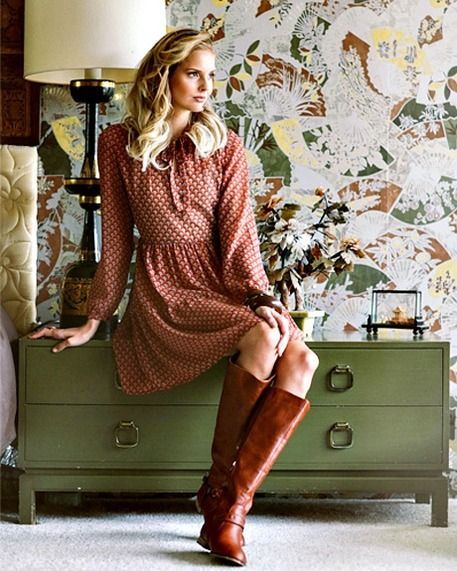
7. Baby Pink Cherries
In 2009, Franny and her lifelong friend and song-writing partner, bluegrass and folk singer and multi-instrumentalist Daniel Maitland (fc: Martin Sensmeier), formed the duo Dara & Danny.
From an article:
Robinson and Maitland have known each other since middle school, when Maitland moved to her small town outside of Atlanta from Alaska. They started out as fiercely competitive rivals before Maitland proposed they marry their talents and begin playing music together. It was a match made in music heaven.
Even when Franny went to NYU and Daniel went to East Tennessee State [the only university with a Bachelor of Arts degree in Bluegrass, Old Time, and Country Music Studies, which he holds], they remained in steady contact and spent their summers at home playing and writing together. The first few years of their music careers were spent breaking into their respective primary fields - jazz music for Franny, bluegrass and folk for Daniel - and coming together to write music and lyrics for each other.
It was again Maitland who proposed they perform together, this time, professionally.
Dara & Danny, a duo made up of jazz musician and bluegrass musician, flirts with jazz music but is primarily influenced by bluegrass, folk, and indie rock a la Rilo Kiley.
“Dara & Danny is where I get to explore the music besides jazz that made me. I grew up in rural Georgia, bluegrass, country, folk music, that was all around me. And I loved it. I love all music,” Robinson said. “Like, I love hip-hop. My husband got a crash course in Outkast and the rest of the Atlanta hip-hop legends when we started seeing each other.”
The pink cherries dress was worn at the 2010 CMAs when Dara & Danny performed. They weren’t nominated for anything that year, but were super jazzed to have been invited to perform.
Dara & Danny, funnily enough, has been Franny’s most commercially successful project. Meaning, tracks have featured in movies, tv, and its what gets the most radio play. Her work in jazz is more highly critically acclaimed, and she is much more prolific with composing jazz music than anything else, but there are more people who first discover her through Dara & Danny that then find out she’s a world class jazz musician than the other way around.

8. Met Gala 2018
You know, the Catholic-themed one. She wore a dress depicting Adam and Eve.
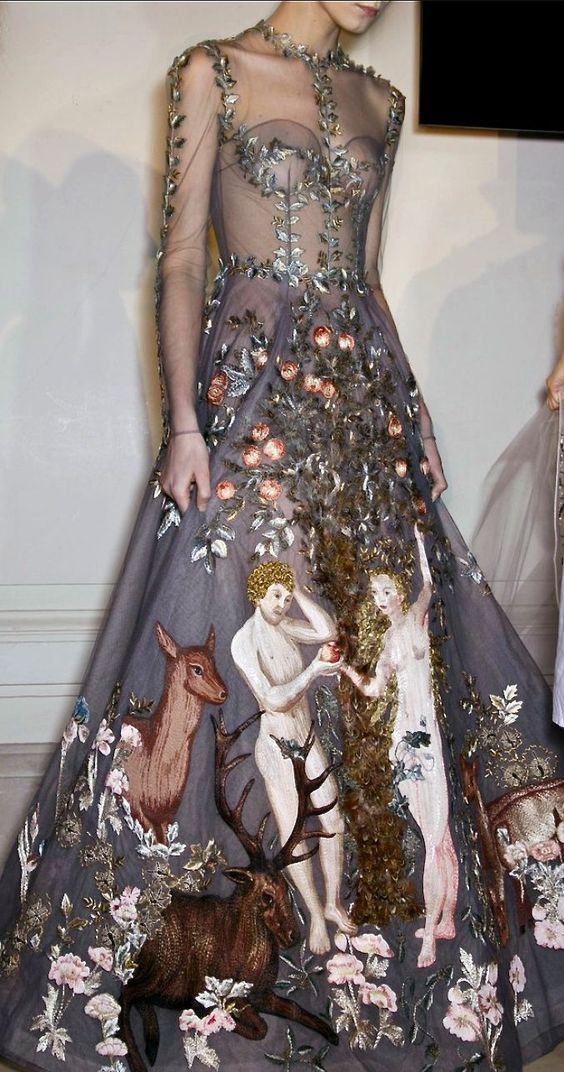
9. National BIcon Franny Robinson
Franny is known for not changing gender pronouns when she sings songs originally performed by men. Prior to her coming out as bisexual in 2017, Franny dodged the questions by simply saying, “That’s how the song was written.”
In 2018 she appeared in a 1940s aesthetic music video for a song by her friend, fellow jazz singer, and out lesbian Lora Lopez. Franny starred as her love interest. There was seduction, there was making out, there was stealing from men. It was so gay.
The ‘Making Of’ video is hilarious because Lora kept laughing every time she grabbed Franny and kissed her because the first time she grabbed Franny she was like “oh my god I’m sorry, was that too rough?” and without thinking Franny went “you’re good, I like it rough, you can make it real kinky and slap me if you want.” Because that’s the kind of jokes Franny makes. And for like five takes Lora could not stop laughing when she grabbed her and kissed her.

10. Seoul Hanoi’d at Glastonbury 2016
Franny’s second most active music project - apart from her constant solo work - after Dara & Danny is Seoul Hanoi’d, the best pun I have ever made in my life. She is a founding member and co-lead singer of the band. Seoul Hanoi’d is a genre-bending performance group entirely made up of Asian-diaspora singers and musicians whose main careers are in various genres.
[I’ll make a full hc post about Seoul Hanoi’d later, too!]
The name, a pun on ‘so annoyed’ comes from the capital of South Korea and a city in Vietnam. Seoul Hanoi’d currently consists ethnic Korean, Vietnamese, Cambodian, Malaysian, Indonesian, Mongolian, Kazakh, Chinese, Nepalese, and Thai diaspora who rotate out for live shows as their schedules permit. The "core” members are almost all at every performance. Of the core members, Franny is absent the most however, because of her wildly busy schedule. She has a hand in composing almost every original song, arranging most of the covers, writing a huge chunk of their lyrics, and is the common thread between most of the other musicians, so she is considered the leader of the group.
Franny wore this outfit during their set at Glastonbury 2016, their first year performing there.

11. Swynlake Adult Prom 2019
The Gatsby-themed one? That was Franny’s JAM. She killed it with her art deco dress!

12. Postmodern Jukebox
Franny’s been featured in a Postmodern Jukebox video, and wore this green velvet dress.
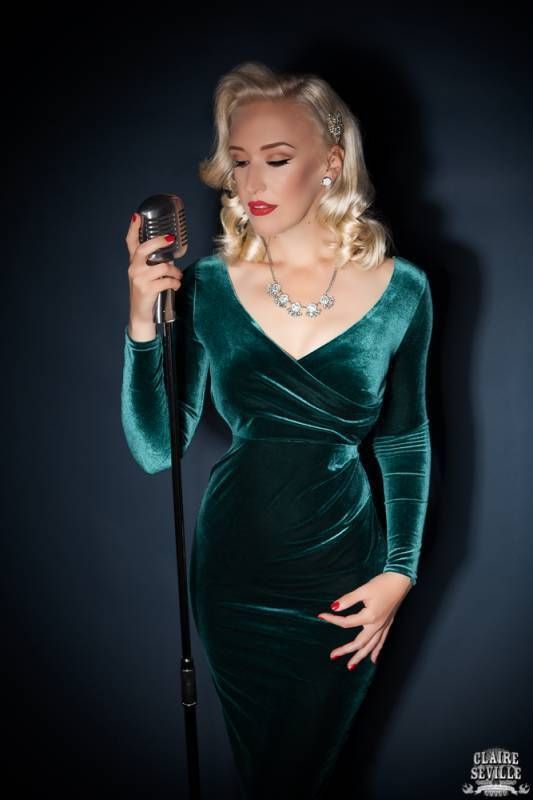
13. Twinning Pink Ao Dai at a Vietnamese Festival with a Vietnamese Friend
The co-lead singer of Seoul Hanoi’d is a Vietnamese-American named Vanessa Pham. Franny and Vanessa met when they were students at NYU through their involvement with the university’s Asian Student Union. Franny, a jazz studies and musical theater performance double major from Georgia, and Vanessa, an engineering student from Texas, found that they had a lot in common.
They were both the only daughters of war refugees who came to the United States in the 1970s. They were both from the South. Franny even spoke Vietnamese almost as well as Vanessa, as she spent her first four years living with her mother in the home of a Vietnamese couple who’d taken her mother in when she was pregnant with her. In both Franny’s hometown in Georgia and Vanessa’s in Texas, the small Vietnamese and Cambodian diaspora groups were very interconnected, so each other’s culture was almost as familiar to them as their own.
They both liked to put bacon in their cheesy grits and put hot sauce on their rice when their moms weren’t looking. They both loved authentic Chinese food as much as the next self-respectin’ first-generation gal, but they also could put away some crab rangoons because cream cheese was truly king. They both could absolutely destroy their older brothers in a fight. They both knew all the worlds to every Dolly, Tanya Tucker, and Dixie Chicks song, but also found their parents’ old Khmer or Vietnamese music comforting.
Franny could count on one hand the number of other Cambodian students she’d met in her time at NYU, so even meeting Vietnamese Vanessa who knew how to order in hesitant, broken Khmer at the Cambodian restaurant they found was exciting. More than that, Vanessa was hilarious! And smart! And such a good, loyal friend. She had a hidden talent as a singer and wanted to do music like Franny, but her parents made her go into STEM for ‘job security.’
Vanessa graduated with her engineering degree and went on to get her masters’, but after working as an engineer for four years she quit to pursue music. It was shortly after she took the leap that Franny approached her to form Seoul Hanoi’d.
On Franny’s Instagram, there’s a picture of her and Vanessa wearing matching pink ao dai at a Vietnamese culture festival earlier in 2019 with the caption, “Thank you for sharing your beautiful voice, laughter, and culture with me for twenty years and counting!”
“What I love the most about Asian cultures is just how many of them there are.” Robinson said in a 2019 interview. “I love when my Desi friends are like ‘hey! be my plus one at this wedding!’ and they invite me to wear their traditional clothing while celebrating with them. I love learning new Vietnamese phrases from my friends. I’m always so honored when I’m invited to participate in my friends’ cultures, because I know when I invite somebody to Cambodian New Year events, or a traditional wedding, its because I trust them to appreciate this important part of me and participate respectfully. Our cultures are so diverse, and beautiful, and vibrant!”
There’s a similar picture of Vanessa and Franny together at a Cambodian New Year celebration, where Vanessa’s wearing traditional Khmer clothing with Franny.

14. Plaid Dress
Franny wore and performed in this dress at the 2011 International Bluegrass Music Awards when Dara & Danny won the New Artist of the Year, and Song of The Year.
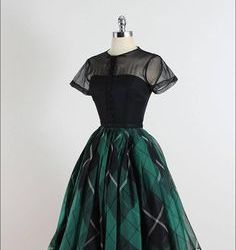
15. That Kickass Outfit
Franny wore this outfit when she attended and performed at the 2015 BRIT Awards, and won Best International Female Solo Artist.

1 note
·
View note
Text
Issue Number 35, Part One

George looks positively STUNNING on the cover of issue 35 of the Beatles Book, which was released in June of 1966.
We are loving George’s tiny sunglasses that would look right at home perched atop Kendall Jenner’s or Gigi Hadid’s nose today. And the fabulous eyewear does NOT stop with George. There is more where that came from in this SPECtacular issue (see what we did there??).
Johnny Dean’s editor’s letter starts off talking about the significance of the number 13 for the Beatles. Apparently producer George Martin had been with E.M.I. for 13 years when he met the fab four, the band’s main fan club was housed at number 13 Monmouth and the song “Paperback Writer” was recorded on April 13th.
The main reason for bringing all this up was for Dean to segue into talking about the recording of “Paperback Writer.” He and the magazine’s main photographer got to go behind the scenes during the song’s recording.
Most of the photos in this issue are from that recording session like these two:

(As you can tell we were NOT lying about the excellent eyewear.)
Dean wrote a lengthy article about the “Paperback Writer” recording session for the magazine.
The session went down at E.M.I.’s number 3 studio on April 13th, 1966. When Johnny Dean arrived with the photographer, John and Paul were in the studio, surrounded by massive amounts of musical equipment. They had recorded the basic track of the song the previous day and were now working on the “detailed backing.”
Dean took great delight and care in describing what Paul and John were wearing. Apparently Paul was dressed very casually in black trousers, black moccasins, a white shirt, black vest and orange-tinted glasses. John, meanwhile, was dressed in green, velvet trousers, a blue, buttoned-up, wool vest and black, suede boots.

Paul in his aforementioned “casual” recording lewk.
George Martin and Paul were having a very serious discussion about how to make the track better. Paul was having trouble, saying they’d done as well as they could with four people.
At that point, George (Harrison, of course) made his fashionably late entrance wearing a Mongolian lamb’s fur coat, with a black cap and “oblong specs.” He arrived “bubbling over with enthusiasm” and immediate got to work with Paul and John.
At that point, Paul, John, George and George Martin were all playing around with different instruments (guitars, pianos, organs) to try to get just the right found for the song.
Ringo, meanwhile was engaged in a game of chess with Neil Aspinall, which he eventually won. No description of what he was wearing sadly, but here is a shot of him so you can see for yourself!

George and John had moved on to vocals and were struggling a bit with the high falsetto parts. George said he’d need a cuppa tea to make it.
Eventually, the band broke for tea and toast with strawberry jam, after which Paul had a moment of inspiration. He got up and started playing “Frere Jacques” on the piano, saying he wanted to add parts of the tune into “Paperback Writer.” Upon playback, George Martin agreed it was a genius addition.
Paul then started playing the organ in a way that sounded like bagpipes, which he wanted to incorporate into the song. Although, he had George Martin play that bit.
In the end, it took about 10 hours to record the song and, we would say, the results were certainly worth it!

(A nice shot of John during the recording for you all!)
The last section of the magazine we’ll talk about this week is the “Beatles Talk” article.
Paul and George had a little convo, starting off by wishing a very Happy Birthday to “Saturday Club.” “Saturday Club” was a famous show on BBC radio between 1957 and 1969. It played a lot of Beatles hits and helped them early in their careers. The show featured a lot of skiffle music, which the lads were very much known for early on.
Paul also talked about how George was now part owner (read: shareholder) of “London’s latest swinging discotheque.” The club was called Sibylla’s and was on London’s West End from 1966 to 1968.
Paul and George then started talking about “Paperback Writer” and the rumor (the rumor Ringo started) that the Rolling Stones would retire if the Beatles’ new single hit number one.
Paul joked that he had spoken with Mick Jagger personally about this and that the Rolling Stones planned to retire in 1997 (if only!). So, George said he would record a sitar version of “Paint it Black” and release it in 1998.
The duo ended their talk by wishing another Happy Birthday to the “Saturday Club!”
Join us again next week for the second half of the mag!
#John Lennon#paul mccartney#George Harrison#Ringo Starr#the beatles#Beatles#beatlebrainiacs#The Beatles Book
46 notes
·
View notes
Text
Esmeralda Nikolajeff, flyer and acrobat, Barely Methodical Troupe: Shift
Swedish circus artist Esmeralda Nikolajeff – who comes from Stockholm – knew she wanted to be an acrobat from the age of two. She started circus as a tiny child with Circus Cirkör, and at 14 took part in Monte Carlo’s 20th Première Rampe festival. She went on to train at DOCH School of Dance and Circus in Stockholm and, since graduating in 2014, has appeared all over the world, working mostly in duos or trios and “learning new ways of being thrown and getting caught”.
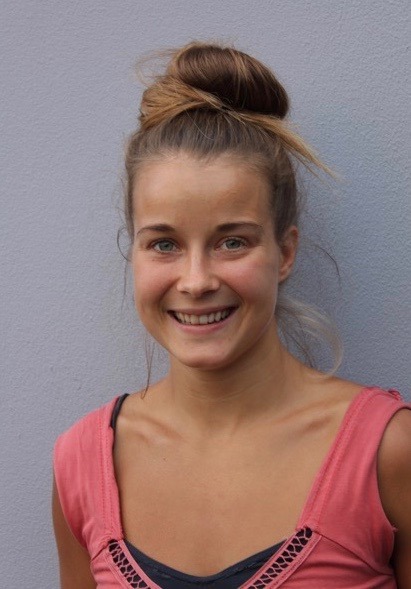
Esmeralda chats to Liz Arratoon before her appearance in Barely Methodical Troupe’s third show, Shift, which also features Elihú Vázquez and BMT co-founders Charlie Wheeller and Louis Gift. It was commissioned by the Norfolk and Norwich Festival – which co-produced it with DREAM – as part of the celebrations for the 250th anniversary of the birth of British circus. Shift has its world premiere at the Spiegeltent in Chapelfield Gardens in Norwich. It runs from 16-27 May 2018.
The Widow Stanton: Is Stockholm your home?
Esmeralda Nikolajeff: More or less. I have a home there but I’ve been renting it out for two years, so I’m more or less living on the road. It’s a love/hate relationship… it’s complex… it’s great and it’s nice to not have to pay rent. It allows me to travel more. But little by little I’m getting a bit worn out by it. I’m starting to miss my home and my own things and my own space, but it’s fine. It’s still working out.
Had you seen any circus at two to put the idea in your head?
That’s such a good question that my parents also ask themselves. They don’t really know. I guess I must have seen something, like picked something up from somewhere. But it wasn’t like we went to a circus show and then I knew. When I told them I wanted to be ‘aerial acrobat’ they were like: “How does she even know those words? Where did it come from?” No one knows.
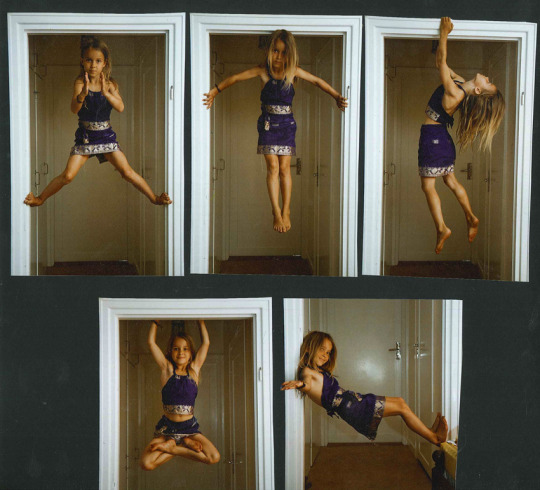
Is there any showbusiness in your family?
Yes, when I was a kid my dad was doing theatre and my mum was creating and producing music. When I was around seven my dad actually got into circus himself because he got quite inspired by me doing it. Then he was out of work and he got an opportunity to work in this Swedish circus, Cirkus Cirkör, in the offices and teaching kids how to do forward rolls and cartwheels and stuff like that. Then he got into the circus scene and he thought it was way more fun than doing theatre. So he just started to practise and now he’s a knife-thrower and a chainsaw juggler. He’s called Jesper.
Where is your name from?
My dad’s father was from Russia. He came to Sweden by train when he was four years old during World War II. He was a child in the middle of the war zone so he was evacuated and went into a foster family in Sweden.
Do you do any other disciplines?
I do a bunch of different things. At DOCH my main discipline was duo trapeze, so trapeze flyer is what I do the most. And then lately, the past two years, I’ve been doing a lot of flying in Icarian Games [Risley], basically flipping on people’s feet. As my side discipline I’ve always been an acrobat. I love doing floor acrobatics and movements, and as I’m quite a tiny person I’ve always been a flyer in all kinds of scenarios… banquine and hand to hand and things like that.
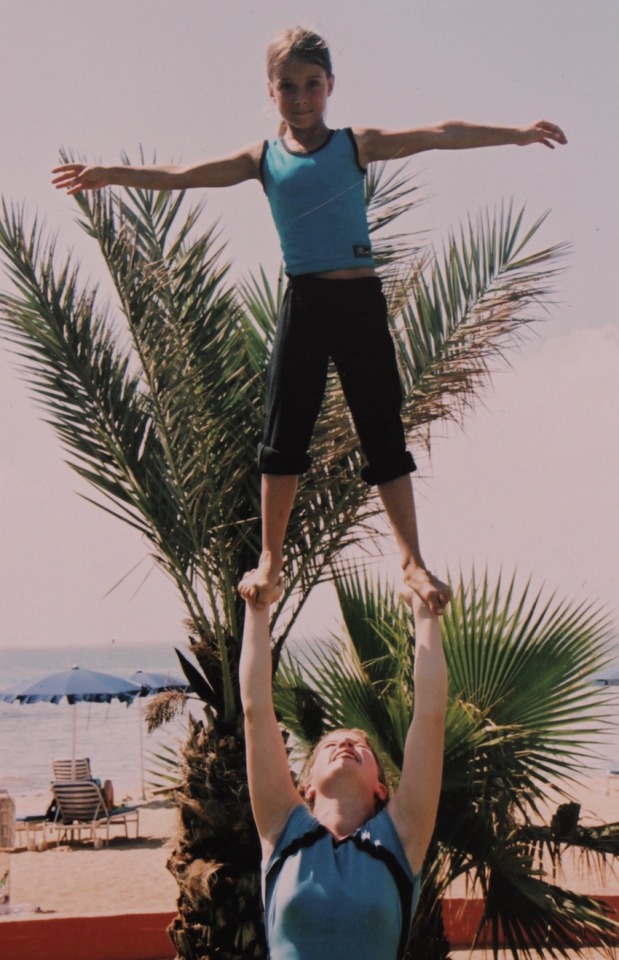
Before you went to DOCH, how did you start doing circus?
First I went to a circus course in Stockholm at Cirkus Cirkör. I started when I was four years old in this little kids’ circus place. Then when I was around seven I told my dad that it was frustrating for me to just train because I wanted to perform. He was like, “Ooh, OK,” and he found a bunch of other kids who also wanted to perform, and we created a youth circus group. So it was like, me and between 10 and 15 other kids who were the youth circus group of Cirkus Cirkör, for some years. Then we kept on growing as a youth circus. My dad was in charge of it and we were training like two or three times a week, and then we did quite a lot of shows. All the money we pulled in with the shows went to the teachers and the facilities at Cirkör, so on Sundays we had the whole training space to ourselves. For the kids it was free to go to the circus classes but we performed a lot.
I did that from when I was seven to about 15, and then I did Circus Cirkör’s circus high school as well. My trapeze catcher is three years older than me and I was a bit tired of normal school so I really wanted to start the circus university with her. But at most circus universities you need a degree from high school, so I was thinking, ‘Maybe I can do it faster?’. I asked my school if I could just go faster and they were like: “We don’t really know but I guess you can try.” [Laughs] So then I did four years of school in two years, and yeah, I graduated early and started DOCH when I was 17.

With your trapeze partner?
Yes, Mira Leonard.
Were you with her at the Première Rampe?
Yes, it was the youth version of the Monte Carlo circus festival, which happens a month before the adult one. We didn't win gold, silver or bronze, but we did receive some kind of trophy. I think they gave everyone one as a prize just for taking part. I don't really remember how it went, I was so young [laughs] but it was a very interesting experience; all these Chinese, Russian and Mongolian children, and us! We were amazed by how heavily drilled all those tiny kids were, because we just did circus for the fun of it.
Was it because you were tiny that you became flyer or what made you choose it?
Being tiny helped a lot. I was always the smallest and lightest person in my class, so I was just used to climbing on people. But then I was also just this little reckless child. I would stand on the highest furniture and jump off and be like, ‘CATCH ME!’. And my parents would have to run through the apartment and slide on the floor and save me from dying. [Laughs] So I guess I had like the adrenaline-rush-addictive part of me already as a child.
What advice would you give to someone wanting to take up flying? You have to be brave…
For sure, you have to be brave but more so you have to be a very trusting person. What I see with a lot of people who aren’t that good at flying is that if someone says: “It’s fine, I’ll catch you,” they don’t believe them. But for me, if someone says that, I trust them to have the good judgment of knowing that they can catch me; maybe not perfectly but so that I don’t injure myself gravely. So [laughs] it’s a lot about just believing in what people say. Hearing: “Yeah, I think this is safe to try,” I go, ‘You think so? OK, then I think so, too’. That’s a very big part of it.
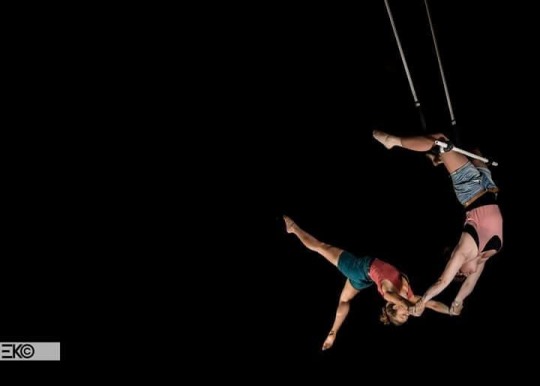
We’ve noticed that DOCH produces really excellent artists; why do you think that is?
When I was going to choose circus schools I was really doubting whether I wanted to do DOCH, because in one way I wanted to move aboard and experience a school in a different country. But in the end I chose DOCH because there’s something about the vibe there that is very welcoming; it’s kind of a light, happy vibe that I get from that place, and my coach in trapeze – Christian Vippen Vilppola – was very positive and very encouraging, whereas a lot of coaches… because we auditioned and we got into other schools and other coaches were a bit more Russian style, never say that anything’s good. If someone’s more or less OK, then you know you did it really well. I don’t really believe in that method of learning things, and that’s one thing that really helps at DOCH that in general it’s quite a positive vibe.
Then it has good reputation so the people applying there are already quite good, and the level of the students has to be pretty good before they start. And then we had quite intensive training. We’d have a lot of different ways of doing things and the school is constantly adapting to each year. They don’t have one way of doing things. For example, our class was really into movement and dance, and we had a lot of ideas about different dance teachers and choreographers that we’d like to have as guest teachers. So we students could suggest: “Oh, this person, from this country is really cool, could we maybe have a workshop with them?” The school would be like: “We’ll look into it,” and after that it would happen. Then we’d have a block of two weeks with this teacher, and I think that’s something that’s really special about DOCH that they do listen to their students’ feedback a lot. They constantly try to adapt to the students’ needs. The year below us was more into theatre and stage acting so they had more of that.
We also had a lot of discipline hours, I think two hours a day of our main discipline and then – I don’t remember – some hours a week with our second discipline, and everyone had acrobatics and I, as a flyer, had two hours a week of trampoline for a year or two to practise the different things I do in the air. Also what we did a lot, we had a lot of presentations. Basically we’d have presentations every other Friday, and we’d get different tasks each time, so we learnt that we had to produce material and ideas. Of course, it cannot always become something good if you have to do it every other week and you’re always tired from training all the time. So then it forces us to learn to fail, and it’s OK and that you can learn a lot from failure. I think that’s such an important thing for artists in general, to not be afraid of trying out ideas that could fail. That’s something they really encourage us to do as well; to not always succeed.
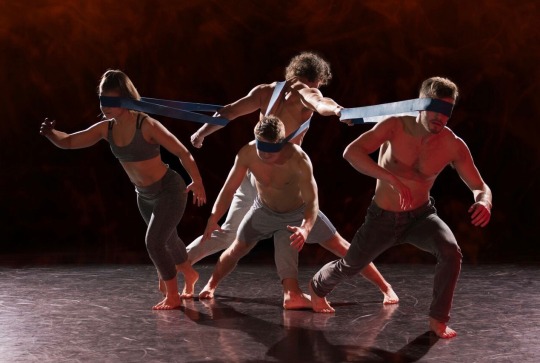
What sort of things have you done since graduating?
I graduated almost four year ago and since then I’ve been doing so many different things. Like, each project has been quite a new experience, so I’ve done everything from… the year I graduated I was working quite a lot in Sweden at Cirkus Cirkör, with the Christmas show, and then I did a show called Borders with them, which celebrated their 20-year anniversary. But also they thought: “We can’t only celebrate in times like this,” so it was a show about borders and refugees. There were 19 people on stage and it was a mix between actors, circus artists and musicians. It was a sort of WOW project that lasted four months and then it was over.
Then I did a site-specific show on an island in Denmark. It’s an island that was man-made to build ships on, so we were exploring it. We did a bit of acrobatics but there wasn’t much circus; it was a dance choreographer who made the work. It was really interesting and we learnt a lot about how to take in different environments and how to relate to them. It was a promenade show. Then I did a show in Berlin for six months…
At the Chamäleon?
Yes exactly. It was called Roots with the Czech company Cirq La Putyka. We played it in Prague maybe 50 times as well. Last year I had more of a year doing my own projects with my friends. We did one show that we performed a bit in Berlin and a bit in Oregon. We were called The Leftover Company. It was something that happened after performing a lot in Berlin and seeing all these leftover people everywhere so we took inspiration from that. We thought how can we make Icarian Games more leftover-y; we created a lot of crash acro, basically, and wobbly acro.
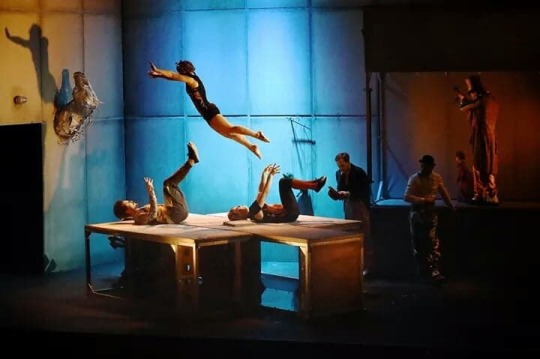
Wobbly is a bit of a trend…
Yeah, I feel it has to do with people being a bit tired of being so rigid and perfect. They just want to be a bit more loose. It’s fun because there are so many different ways of doing it. We have a trapeze act where I’m kind of all limp, which we did in Roots, but this crash acro is really more explosive, like, kind of aggressive crashes. [Laughs]
How did you get involved with Barely Methodical Troupe?
I met those guys at the wedding of some friends of ours in Australia. It was Dan and Rhiannon Cave-Walker’s wedding, who were in my year in DOCH. After the wedding we hung out for a bit and were acro-jamming on the beach. Then BMT contacted me and asked if I might be interested in joining their next show. I was like, ‘Yeah!’.
Have you seen their other shows?
No, I haven’t but as the circus world is so small, and so many friends of mine have, it seems like I have and I can imagine what they were like. I’d really like to see them. They are very fun to work with, very easy to work with and very encouraging and motivated. In general there’s this positive, fun, playful vibe going around, which, without seeing their shows, I can imagine translates to the stage.
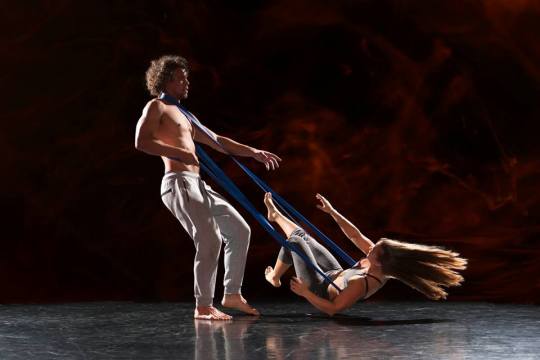
Are you able to you tell us anything about the new show?
I won’t say too much. We’ve been inventing new acts and working a lot with elastic bands, Thera-bands, the kind they usually use for rehab. So we have quite a lot of them in the show and in general we’ve been working a lot with elasticity. Throughout this process I actually learnt how to say that word because for me it was a very hard word to say [laughs] so I’m very proud every time I manage it.
Can you pick out some highlights from your career so far?
Yes, a lot of things, but I must say the Chamäleon contract in Berlin was a really life-changing experience, also because I got to stay in one city for half a year and have stable work and do 180 shows in a row. That’s a quite insane thing to do. I don’t know if I could it again but I’m very glad I did it. So that was one highlight and then this past year I’ve been doing a show – Knekke Greine – together with my friends in the forest. It’s a show where we encourage people to remember that we have go out into nature and explore the woods even though you live in the city. It’s a very interactive performance and it’s more of a forest/nature guided walk with a lot of crazy interactions happening all around. The creation was just in the woods in Sweden so that’s been really fun.

Esmeralda appears in the world premiere of Barely Methodical Troupe’s Shift at the Spiegeltent in Chapelfield Gardens during the Norfok and Norwich Festival from 16-27 May 2018.
Picture credits: Headshot, Di Robson; Shift, Chris Nash; wobbly trapeze, Einar Kling-Odencrants
For Shift tickets click here
Esmeralda on Facebook and Barely Methodical Troupe’s website
Twitter: @BMTroupe @NNFest
Follow @TheWidowStanton on Twitter
Read our archive interviews with BMT’s Charlie Wheeller and Louis Gift
#barely methodical troupe#shift#norfolk & norwich festival#interview#circus interview#circus flyer#Risley act#duo trapeze#mira leonard#doch stockholm#di robson#esmeralda nikolajeff
2 notes
·
View notes
Text
Apropos of Nothing: My Foreign Language Knowledge
Discovered some interesting posts about foreign languages tonight so felt like bragging about my own language knowledge.
- I am fluent in English, which is also my mother tongue. But you probably figured that out already.
- I am proficient in French, Spanish, and Japanese. I minored in French in college, so I’m most proficient in that of these three. I can read, write, speak, and understand it. Due to my college only having French classes up to 300 level (I went to a state school with not much of a Languages Department), I’m basically at an intermediate level; when I took the e-TEF (the Test d'Evaluation de Français - basically the official proficiency test given by the French government) a few years ago I think I got B1 overall, which is lower intermediate.
Spanish I’ve only taken one class in, a Conversational Spanish class in 8th grade. But I’ve worked at a couple jobs where I was surrounded day in and day out by Spanish-speaking people, and somehow I managed to pick up a lot, enough to help customers pretty well in Spanish, and to be told by Spanish speakers that my Spanish is very good. I only know one verb tense, most of the words I know have to do with food, and I sometimes get my words mixed up, but I manage. I try to practice my Spanish on my Spanish-speaking coworkers, as well as trying to sound out the Spanish text on bottles and boxes. (Here in California, almost every product has text on it in English and Spanish).
Japanese I picked up from watching a lot of subtitled anime. Seriously. I also used to own Berlitz’s book Essential Japanese and would go through that. I’m able to speak pretty decently, and to recognize Japanese if I hear it spoken. Plus, I’m getting to the point where I actually understand a lot of the Japanese songs I listen to (both anime songs and regular j-pop). I can’t read or write Japanese though, but I would like to learn. I’m also very interested in the culture (beyond just anime and manga) and have done lots of research on it. There is a Japanese Garden near me that I visit fairly often; I went to their Cherry Blossom Festival earlier this year, and got to see some great cultural demonstrations (ondo dancers, a koto and shakuhachi duo, taiko drummers, and this guy doing a really old form of poetry) and eat under one of the many cherry trees they have there. Last time I went there, I got to make a teru teru bozu, this little ghost-looking thing that is supposed to bring good weather if you hang it in your window. I’ve also gotten into some vloggers who vlog about Japan, so I’m learning quite a bit that way culture-wise.
- In addition to those four, I can speak bits and pieces of Italian, German, Mandarin Chinese, Russian, and Hebrew. Russian and Hebrew I tried learning through podcasts - One Minute Russian and Learn Hebrew Pod respectively - but then gave up. I don’t recommend Learn Hebrew Pod because they make you get a paid subscription to get the most out of it, which kinda defeats the purpose of a podcast, and is probably why I quit listening to that one. I got into these two languages cause of my heritage - I am 1/8 Jewish (which probably is barely anything, and plus I’m not Jewish religiously) and my paternal great-grandmother was from Latvia, which was under Russian control at the time. Italian I picked up from I don’t know where, Chinese ditto. German I picked up a bit from a friend I had in junior high who was taking it; I’ve also been listening to some of the songs Super Moonies did for the German dub of the 90s Sailor Moon anime. (My fave is “Kämpfe Sailor Moon”).
- I can also sing songs or parts of songs in other languages - French, Spanish, Italian, Japanese, and Hebrew, in addition to English of course. (This is mostly due to anime and to Josh Groban).
- I have tried to expose myself to films in other languages. I’ve seen several Chinese films, the most recent being one I got from the library last year called Balzac and the Little Seamstress, which is set during the Maoist period. I’ve seen Japanese films too, though mostly anime; the most recent one I saw was Makoto Shinkai’s Your Name. Last year, though, I finally saw Rashomon, the famous Akira Kurosawa film from 1950. I watched that at the same time as the Little Seamstress one; I was doing the Artist’s Way 12-week thing with some friends and did an “Asian Day” Artist’s Date in honor of Lunar New Year. I watched films in Chinese, Japanese, Mongolian, and Tibetan that day. I was also going to watch a film in Vietnamese and one in Korean, but I got tired after the first four. (I got all those from the library too…that library has a rather large foreign film selection). Other than this I have seen a few French films (like Au Revoir Les Enfants, Amélie, the animated film Kirikou et la Sorcière, and Cocteau’s La Belle et La Bête), a few Bollywood films, one in German and Russian called Europa Europa, and the sad Italian WWII movie Life is Beautiful, among maybe others that I forgot.
Ok, bragging over. I think I have made my point. Basically, languages come rather easily to me. Maybe it’s talent, maybe my autism, maybe inheritance (my dad’s grandmother knew 7 languages when she came here from Latvia). Not sure. Also, I think it’s sad being multilingual doesn’t seem to be a priority in the U.S. But that’s a whole other argument.
2 notes
·
View notes